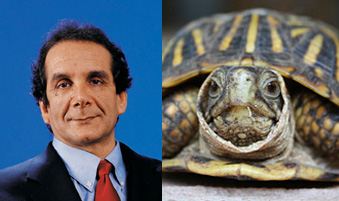Paul Mulshine has pissed off a lot of rightie bloggers with “All I Wanted for Christmas Was a Newspaper: Bloggers are no replacement for real journalists.” After outlining the economic problems of newspaper journalism, he says,
The problem is that printing a hard copy of a publication packed with solid, interesting reporting isn’t a guarantee of economic success in the age of instant news. Blogger Glenn Reynolds of “Instapundit” fame seems to be pleased at this. In his book, “An Army of Davids,” Mr. Reynolds heralds an era in which “[m]illions of Americans who were in awe of the punditocracy now realize that anyone can do this stuff.”
No, they can’t. Millions of American can’t even pronounce “pundit,” or spell it for that matter. On the Internet and on the other form of “alternative media,” talk radio, a disliked pundit has roughly a 50-50 chance of being derided as a “pundint,” if my eyes and ears are any indication.
The thing is, there’s reporting, and there’s commentary, and neither Reynolds nor Mulshine seem to be able to distinguish the two. This in itself is a sad commentary on the state of reporting. Yeah, anybody can offer opinions, but not everybody can be a news reporter.
The conceit on the Right Blogosphere — I really haven’t seen as much of this nonsense on the Left — is that an army of “Davids,” or little-guy bloggers, could replace journalism. If by “journalism” one means “reporting,” I say, not likely. Reporting for the most part is the daily slog of going forth to cultivate and talk to sources, interview insiders, assume the sources and insiders are all lying and talk to other sources and other insiders, check police blotters, chase ambulances, and otherwise dig through a lot of boring documentation so that you are as certain as you can be that what you say is true before the copy deadline, because your highest mission is to be accurate. That’s what reporters do.
There are bloggers who have done real reporting. I am thinking of Marcy Wheeler and her work on the White House sandbagging of Valerie Plame. Several bloggers sat through Patrick Fitzgerald’s prosecution of Scooter Libby and gave us first-hand reporting, with context. That was first rate. That also was not the norm. The norm is that most of us are doing commentary, not reporting. We are offering opinions, not news stories. And I do not think an army of amateur partisans working in their spare time can replace full-time, professional journalists at gathering news.
“When enough bloggers take the leap, and start reporting on the statehouse, city council, courts, etc. firsthand, full-time, then the Big Media will take notice and the avalanche will begin,” Mr. Reynolds quotes another blogger as saying
And if these bloggers are not working for someone, exactly how are they going to make a living? And if by chance these same individuals get good at newsgathering, how would they be any different from the people doing newsgathering now?
A reporter learns to be a good reporter, or not, by working for a real hard-ass city desk editor who questions everything he writes, makes him check and re-check his sources, and hands him his ass on a plate when his bylined story gets the facts wrong. I had that experience many years ago and decided I was too emotionally fragile to be a newspaper reporter (although I think maybe I could handle it now). I swear I can pick out reporters who have been properly initiated into the tribe and those who have not. Someone working independently of editors is unlikely to be properly humbled, which is the first step of learning the craft.
I know what good reporters do and I have respect for it. I also don’t do it. Neither does Glenn Reynolds. I can’t think of anyone on the Right Blogosphere who does. (Little Lulu’s “investigations” are harassment, not reporting.) On the Left, beside the above-mentioned Marcy Wheeler and the Libby Trial crew, there are sites like Talking Points Memo taking on paid staff to do news reporting, so sometimes the lines blur.
But most blogging is commentary, and commentary is not reporting. Good reporting does require some analysis, as Mr. Mulshine says. A good reporter has solid background knowledge of what he is reporting combined with an ability to zero in on what the news consumer needs to know to understand the story. Yes, there are a lot of bad reporters who don’t do that.
However, Mr. Mulshine loses it when he says “the type of person who is going to offer great insight into complex issues” is unlikely to be found on the Web. When Glenn Greenwald Josh Marshall are writing for the Web and Jonah Goldberg is writing for the Los Angeles Times, newspapers have lost the right to be proud.

